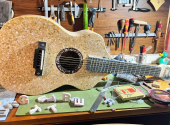
5 Ways to Upset Female Musicians
If you're a girl and you want to make music in a different way than as a decorative singer in a local party band or as an artificial puppet who can't play at all, you'll probably find it a lot harder than most men. Although every promoter tells you that their line-up is open to everyone and that "nowadays the opportunities are even, after all, no one is stopping girls from participating," there is still a subtle, but all the more solid network of established prejudices, expectations and unwritten rules in the music culture that make things difficult for female musicians – forcing them to prove that they "can do it" to a much greater extent than their male counterparts. Today, let's go over some classic examples of how to piss off any female musician who is serious about playing.
1. It's all about the looks
"We might not sing well, but at least we look great," we used to joke behind the closed door during our exams at the conservatory. And let's face it – many women rely on this strategy if their musical qualities are not worth much, but they still want to make it in the music business. But if you're really interested in music and you want to develop your playing skills and create your own musical projects, the constant assessment of the "cover" at the expense of "content" is rather a nuisance.
It's frustrating when after a well-played gig you hear a ton of compliments on your appearance, but not a word about your playing technique, compositional ideas or your solos. It is equally annoying to hear resentful remarks saying that your success was certainly not due to your musical skills, but rather your beauty. It's almost more "harmless" to be the one who "is so ugly that I wouldn't touch her with a ten-foot pole but she can play" (a real quote from a friend of mine). Everybody likes to hear a compliment on how pretty they look. But it would be nice if musical skills were praised in the first place.
2. Questions about family and housework
"And when do you plan to start a family?" – "How do you manage to combine your parental role with your music career?" – "What do you cook at home? How do you clean?" – "How does your partner feel about your musical career?" While very few people ask male musicians such questions in interviews (after all, it has nothing to do with their musical work, the wife takes care of the family at home, doesn't she?), female musicians have to answer such questions in interviews on a regular basis, and not only in magazines or programmes designed "for women".
If they don't have children, they are expected to have them (or "should have them"), there are even people who think that motherhood is the main task in a woman's life and everything else – for example, artistic work – is just a kind of supplement, something they do for fun, in their free time, like embroidery... And if the musician has children already, the conversation often drifts to family care simply because not every man is willing to look after the children at home when his partner goes out to play. She often has to take the kids with her or struggle to find a babysitter, so she certainly can't say that music and family are two separate fields. Yet with all the love for the kids, it's nice to go somewhere without them and be "just" a musician, an artist, a player...
Of course, there are exceptions and I hope that times are changing too. However, the constant references to motherhood as a woman's main role and the frequent linking of women with the term "mother" can be quite tiresome.
3. Sexist jokes
"You play the alto saxophone? Why don't you play the tenor? You should have something bigger in your mouth, haha..." – "Of course I like women behind the drums – especially when they're only wearing a tank top." – "I like when a girl plays the cello because she's got her legs apart." I was once completely blown away by these and other statements uttered by two unnamed music professionals. Unfortunately, I had already drunk three beers at that point, so I couldn't refrain from expressing my opinion – followed by an exhausting, probably two-hour-long discussion about the unfairness of sexism.
A lot of women grew up in an environment where such macho behaviour is considered the norm, so they don't even notice how damaging it is to their starting position. Some, on the other hand, are opportunists who just giggle at such talk thinking that the ends justify the means. The others have roughly two options: a) they deliberately choose the "I'm pretending I have overheard it, but you and I won't be friends" strategy (which requires a very high level of Zen). Or b) they will try to brush the person off or even explain to them how wrong they are (which requires a huge amount of energy and you will not be friends almost certainly). Sexist comments are often pronounced in an attempt to make a move on someone (after all, "the quarrel of lovers is the renewal of love", isn't it?), while at the same time, the person in question is hinting to the musician that he doesn't regard her as a relevant bandmate. Luckily, these sleazy individuals are slowly diminishing.
4. Comparing what is "masculine" and what is "feminine" aka stereotypes rule
"A woman can never play as good a guitar solo as a man." – "Women are gentler creatures than men, they don't understand hard music." – "His voice is too high for a man." – "Women are more emotional than men. And they can't think logically, so they can't write good music."– "A man can't play the harp, it's an instrument for girls." Even in the 21st century, ideas of what a "real man" and a "real woman" should look like and behave like creep into more than just music. Who cares that these ideals are mostly created by our society and upbringing and few people actually match them?
The problem arises when someone crosses these "aesthetic boxes" (for example, when a girl can use the vocal technique of growling or when a man sings in a falsetto – a high vocal register) or when a female musician has not even had time to express herself but she is already dismissed because as a woman she "doesn't have it". This mindset is quite constraining and certainly not conducive to the free development of artistic creativity.
5. Pretending you are not there
"I was at a jam session, and then we were all standing outside, and I felt like whenever I said something, the guys interrupted me and started talking about something else. Like I wasn't even there." A fresh experience from a musician and a friend of mine. A lot of women outside of the music industry experience similar situations. I've experienced something like that in a theatre setting, where I would bring up an idea and then a colleague would interrupt me and start repeating the exact same concept out loud – and lo and behold, everyone started complimenting him on how great it was, even though it was originally my idea. He was just louder, more dominant and played hardball.
It's not easy to break through as a girl when, unlike boys, we were brought up to be "good, obedient and not too assertive" (because otherwise, no one would even touch us with a ten-foot pole). So even if we have a good idea and a good solo, we might be upstaged by some loudmouth with a strong voice and physical superiority who, as a boy, was encouraged to force himself everywhere and earn his space. In the music world, this is reflected in the way individual players (don't) fight for solos at jam sessions, the musical material and skills they dare to start a band with and get on stage, or just the way they (dis)respect others.
If you have found an error or typo in the article, please let us know by e-mail info@insounder.org.





